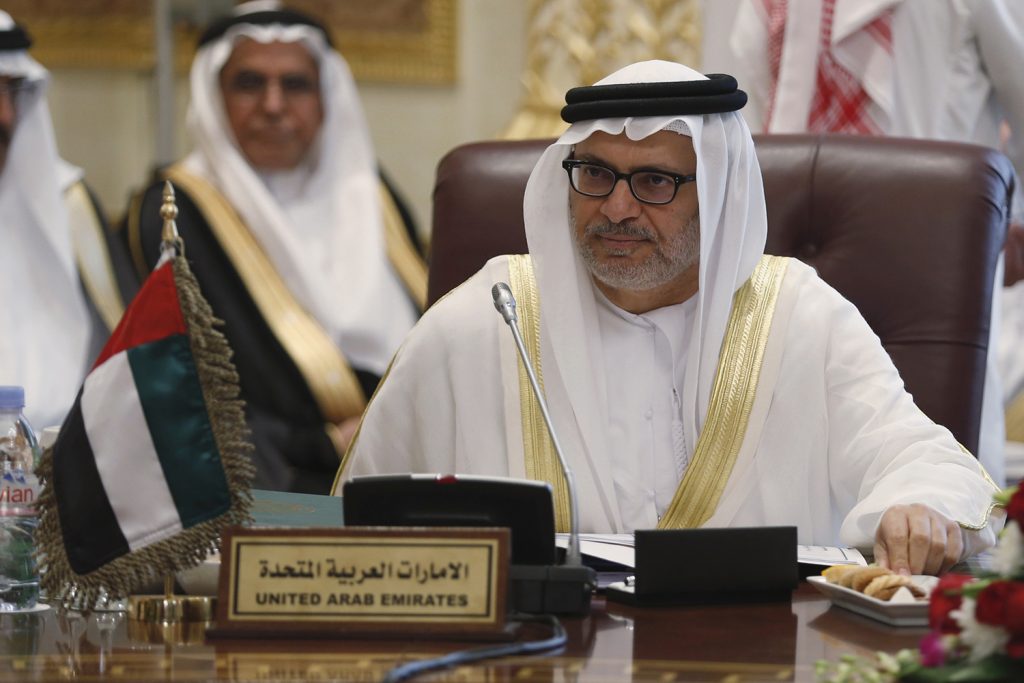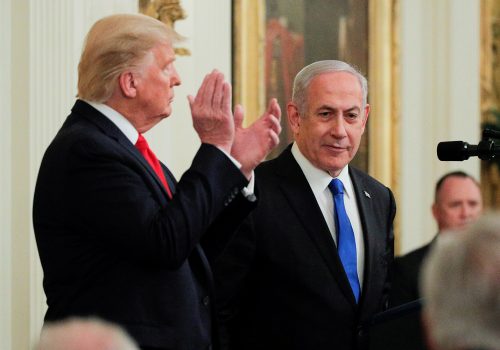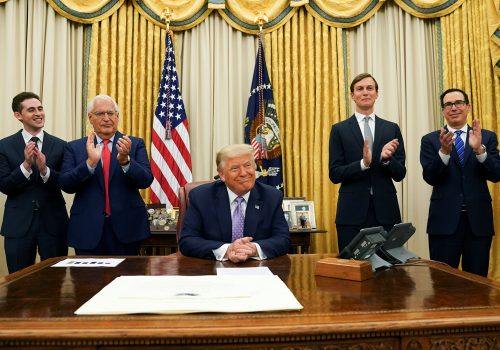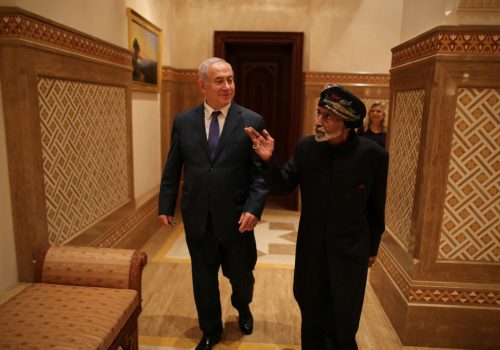Key takeaway: The normalization of relations between Israel and the United Arab Emirates (UAE) was just “a matter of time,” according to UAE Minister of State for Foreign Affairs Anwar Gargash, but the UAE finally struck the deal in return for the suspension of the Israeli government’s annexation plans, he said.
Speaking at an Atlantic Council Front Page Event on August 20 with Kirsten Fontenrose, the director of the Atlantic Council’s Scowcroft Middle East Security Initiative, Gargash argued that the US-brokered deal between the UAE and Israel will help further efforts to achieve a solution to the Israeli-Palestinian question by removing the prospect of Israeli annexation of the West Bank, which is “the biggest threat to the two-state solution.” The agreement made the UAE only the third Arab country to formally recognize Israel.
Here’s a quick recap of Gargash’s remarks on the origins of the deal, the impact the new UAE-Israeli relationship will have on the region, the prospects for dialogue with Iran, and more:
Deal was a long time coming—but opportunity arose
- “A matter of time”: Gargash explained that Israeli-UAE relations have been slowly developing for years, as both sides worked through issues such as visas, convention attendance, and export agreements. The official normalization of relations, he argued, “was bound to happen” soon, and if a deal was not reached this year “it would have happened in 2021 [or] 2022.”
- Annexation provides the catalyst: As the Israeli government indicated that it was preparing to annex parts of the Palestinian territories, UAE officials were driven to act to avoid this potentially disastrous scenario, Gargash said. Additionally, many foreign officials in the region and Europe also raised the possibility that normalization could be offered in return for ending the annexation push, he reported.
- Annexation pause is not forever, but provides needed time: Amid concerns that the text of the deal does not guarantee the Israeli annexation pledge for a specified time, Gargash clarified that the agreement is not seen as lasting “in perpetuity,” but he added that he does not see the Israeli commitment as “tactical and one that the Israeli government will renege on in a few months.” He stressed that the deal provides “a good period of time to avoid annexation” and will push both the Palestinians and Israelis to the negotiating table.
UAE pursued deal with Israel and US alone
- No advance notice: Palestinian leaders criticized the deal for excluding their input and conceding normalization without a formalized two-state solution. Gargash confirmed that the UAE “did not discuss this deal prior to the announcement with any of our friends … because we clearly thought that this would jeopardize this deal.” He also maintained that the UAE “does not negotiate on behalf of the Palestinians,” who will be “the ones who can really come and say yes or no to a solution.”
- Will others follow suit?: Saudi Arabia announced on August 19 that it would not establish ties with Israel until a formalized peace agreement with the Palestinians was reached. While Arab neighbors may not rush to join the UAE, Gargash argued that “every important capital” in the region “is basically supportive” of the deal and “several Arab countries” are “in different stages” of normalizing ties with Israel.
- The need to act: While Saudi Arabia and others are set to maintain their positions, Gargash argued that the region “cannot be prisoners of rhetoric” on the one hand “and at the same time stagnation and inaction” on the other. The UAE’s own interests must also be taken into account. “An exclusivist view of the world through a purely Arab prism will not allow you to play up to your potential” on the world stage, he said. While cautioning that the UAE cannot negotiate on behalf of the Palestinians, he promised that “if the UAE identifies basically a potential gain and advantage” in future deals, “we will take the risk and we will take the heat.”
- F-35s in the future?: Gargash expressed hope that the normalization of relations will open the way for the UAE to purchase F-35s from the United States, a move that Israel continues to oppose. Gargash argued that with the agreement “the [threat] of a war with Israel will no longer exist,” which should mean that “any hurdle” towards purchasing the F-35 “should no longer be there.” He stressed that the F-35 issues was “not connected to this deal.” President Trump said on August 19 that the United States is reviewing the potential sale to the UAE.
Iran set stage for agreement, but the agreement isn’t about Iran
- Tehran brought UAE and Israel together: Gargash acknowledged the role that Iran played in opening the door to closer UAE-Israeli ties. “The Iranian rhetoric and aggressive regional position over the years has made deals like this possible,” he argued. While maintaining that the main rationale for the agreement was to avoid Israeli annexation, he stressed that the UAE was also driven by the “belief that the region does need a strategic breakthrough.” Indeed, former US National Security Advisor and Atlantic Council Executive Vice Chair Stephen Hadley, who introduced Gargash at the event, described the deal as “the most strategic development in the Middle East in recent memory,” with “the potential to unlock peace, prosperity, and security in the whole region.”
- Deal should not be seen as a threat: At the same time, Gargash was careful to indicate that Tehran should not see the new Israel-UAE relationship as threatening. “This deal is not about Iran,” he clarified, nor will future cooperation with Israel “target” Tehran. He added that the UAE is happy that both US President Donald J. Trump and Former Vice President Joe Biden have indicated a willingness to open “necessary” dialogue with Iran after the US presidential election.
Annexation delay is the main prize, but other benefits will follow
- UAE’s global role: Outside of the annexation issue, closer ties with Israel have been a target for the UAE as it attempts to “reaffirm its global position,” Gargash said. If the UAE truly wants to be a global economic and political player, he explained, “you can’t do this while maintaining a sort of exclusive view of the world.”
- Shared dynamism can spark growth: Gargash stressed the many areas of economic cooperation that are now open to both countries after normalization. While the first areas of focus will be administrative concerns such as visas and mutual recognition of government documents, he highlighted agriculture, food security, medicine, technology, and banking as potential areas of mutual benefit. The UAE will gain access to the “technological prowess of the Israelis,” while “they will benefit also from the dynamic nature of the UAE economy,” he said.
David A. Wemer is associate director, editorial at the Atlantic Council. Follow him on Twitter @DavidAWemer.
Further reading:
Image: United Arab Emirates' Minister of State for Foreign Affairs Anwar Mohammed Gargash attends a Gulf Cooperation Council (GCC) meeting in Riyadh March 12, 2015. REUTERS/Faisal Al Nasser



